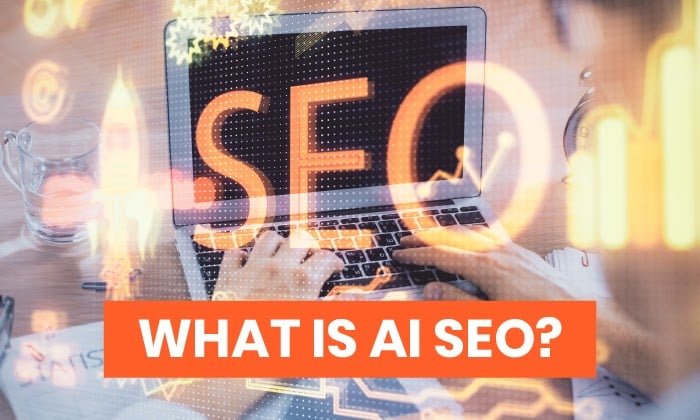
The internet has become the go-to source for everything from trivia about celebrities to fixing our kitchen sinks. But AI SEO may be changing the way marketers help their sites rank high on search engine results pages (SERPs).
Failure to rank may result in your business missing out on valuable search traffic. Which means far less revenue for your business.
For a long time, you could get by with basic SEO strategies.
But not anymore.
With artificial intelligence (AI) taking over the world, you need to up your game.
What does that mean for your SEO strategy?
What is AI?
Artificial intelligence (AI) is an umbrella term that covers several different technologies, including machine learning (ML), computer vision, natural language processing (NLP), deep learning, and other, still emerging technologies.
What’s the point of AI?
AI has one principal goal – to perform (often laborious and mundane) cognitive tasks better and faster than humans. It is a technology designed to make our work and life easier.
In business, AI has already proven to be effective in increasing revenue.
In sales and marketing, 30% of AI adopters cited a 6-10% increase in revenue after implementing the technology.
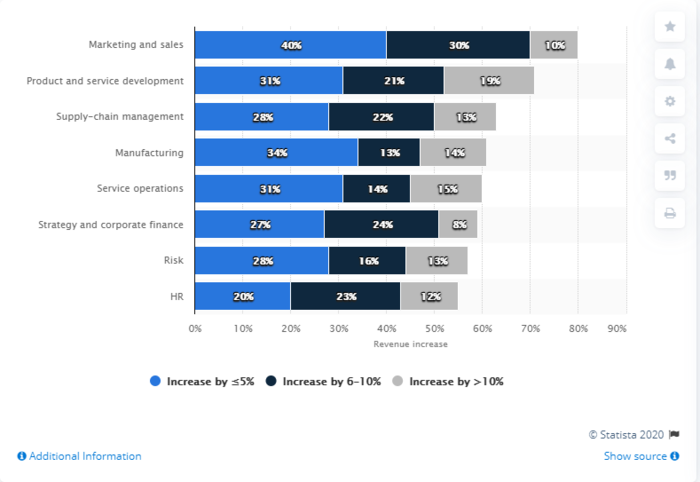
These are pretty impressive results.
And yes, AI can also be beneficial to your SEO.
But, will AI replace SEO?
Emphatically – no!
Let’s talk about how AI is impacting SEO and why it won’t be taking over.
What is AI SEO?
AI has become a core component of major search engine algorithms, including Google’s Rankbrain and BERT.
This factor means if you understand AI and how it impacts search engines, you can boost your SEO using AI.
But that’s not all.
AI is also an excellent tool for data analysis, which is a significant part of designing an effective SEO strategy.
From helping you spot trending topics to discovering content gaps, you can do tasks faster and more efficiently with AI-powered SEO software.
AI and SEO are a match made in digital heaven.
Why is AI SEO Important?
Although both AI and SEO are complex disciplines, used together, they make it easier for you to boost your website’s rankings.
One thing to keep in mind about search engines is they always put the user first. They aim to deliver content that’s as relevant as possible.
Because of this, SEO is not just about keywords anymore. It’s about:
- Concepts: What is the idea behind the searchers’ query?
- Context: What is the intent behind the searchers’ query?
- Customer satisfaction: What are the most relevant answers to the user’s query?
So, keyword stuffing doesn’t work anymore (and hasn’t since Hummingbird). For your content to rank, you need a great link building strategy and to optimize for AI-powered search engines.
Today (and in the future), one of the main factors that impact ranking is user experience. And AI is one of the best ways to provide website visitors with a positive experience.
Let’s quickly look at six ways it can help boost your SEO.
AI SEO: 6 Ways to Use AI to Improve Your Website
Now that you understand what AI is and how AI SEO can impact your site, let’s look at a few ways you can use AI SEO to keep up with modern SEO tactics.
Opportunity Discovery With AI SEO
One of the most important aspects of SEO is discovering hidden ranking opportunities that haven’t been exploited.
That’s one of the areas artificial intelligence SEO is proving to be effective in helping boost your website’s rankings. Powerful AI-powered SEO tools have emerged in the last couple of years, giving you more in-depth insight into:
- Keywords you should be targeting
- Link building opportunities
These and other insights that you can get from AI-powered SEO software are crucial to crafting a content strategy that will exponentially boost your website’s SEO.
With the competition to rank becoming fiercer by the day, you need to find keywords, topic ideas, and other SEO opportunities that aren’t too common.
Find opportunities that your competition is not exploiting, and you’ll have a much better chance at ranking.
Granted, finding these opportunities manually takes a lot of creativity, time, and hard work.
However, with the help of AI-powered SEO software, like BrightEdge, you can uncover golden SEO opportunities faster.
This is one of the main reasons AI must be a part of your SEO strategy.
Content Creation With AI SEO
Discovering content opportunities is only a small part of the battle to dominate the SERPs.
You also have to create content that hits the mark.
This is where AI can help improve your SEO.
How?
Once you’ve used a tool like BrightEdge to find keywords, you can use AI to help you know what kind of content you should create.
Once fed with your target keyword, AI-powered tools scour the web for content created around that keyword. In a few seconds, you’ll find:
- Content gaps to exploit
- Trending topics
- The average number of sections to include
With insights like these, it becomes easier to create content tailored to solve specific problems for your audience, in short, personalized content that satisfies user intent.
Not only that, but AI can help you ensure that the content you create is relevant for each stage of your funnel.
Content creation is no longer just about creating poor quality content that ranks. It’s about creating content that users will find helpful.
And that’s exactly what AI will help you do.
Content Optimization With AI SEO
For a long time, content optimization has been about keywords, internal links, backlinks, and other on-page SEO tactics.
Those things still matter.
But search engines now look at more than just those indicators. Search engines are getting better at figuring out precisely what searcher’s intent is while searching.
How can you optimize your content for user intent?
You guessed it – with the help of AI.
AI SEO tools help you:
- Create topic clusters that answer user questions and rank
- Know the optimum length of content on your given topic
- Use keywords and LSI keywords correctly
With AI, you can optimize your content to meet Google’s E.A.T standards found in their search quality raters, guidelines. You can create content that expertly answers user queries authoritatively. And that’s the kind of content Google loves to serve its users.
But AI doesn’t end at helping optimize content for search engines. AI-powered writing tools like Atomic Reach and Grammarly (among a slew of others) also help ensure your writing makes for a pleasant read.
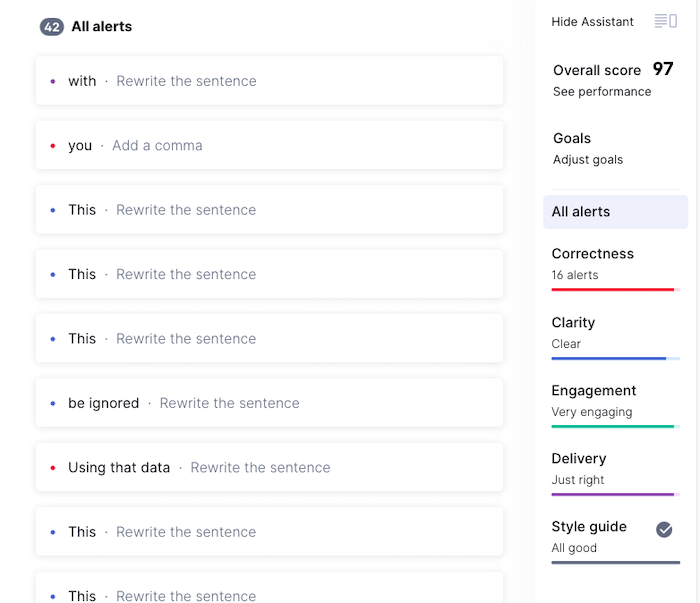
This also helps increase dwell time, another factor that indicates to search engines that your content is useful.
The bottom line is AI can help you create better optimized content that your readers will love and engage with.
Optimizing for Voice Search
One of the fastest evolving areas of search is voice search.
With more people relying on their voice-activated devices to search the internet, voice SEO (VSEO) has become an aspect of SEO you can’t ignore anymore.
Just take a look at how fast the number of voice-activated assistants is rising:
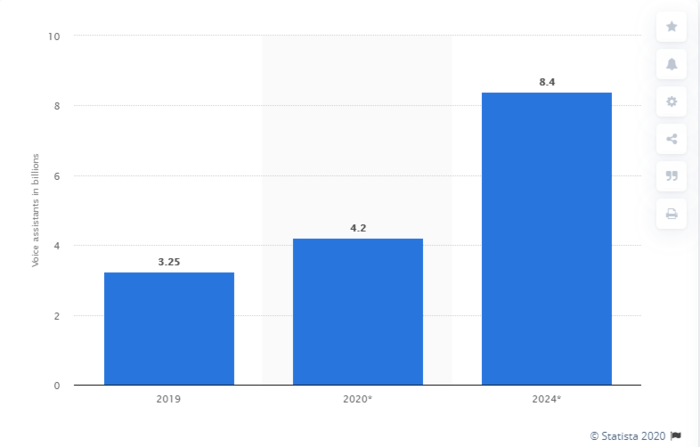
Statista forecasts that the number of voice assistants globally will reach 8.4 billion in the next few years — which is more than the world’s population.
Most voice searches are in the form of questions, so one of the main ways to optimize for VSEO is by answering the questions people are asking.
This is where AI tools come into play.
For example, tools like Frase help you create VSEO optimized content by showing you the questions searchers are asking. You can then create content around these questions.
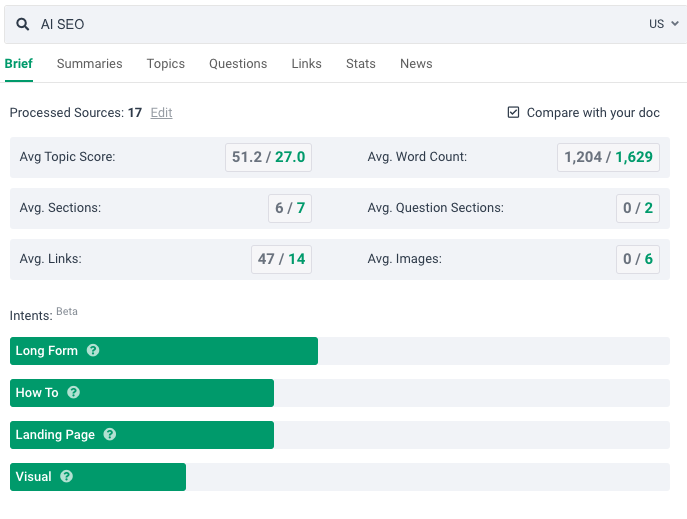
Another aspect of voice search is that it’s conversational. This is where AI principles like NLP come into play.
AI-powered content tools like Grammarly and Hemmingway can help you create more conversational content by recommending tone changes and highlighting hard to read passages.
One thing to note about VSEO is that it is hyper-competitive. That’s because voice assistants only give one answer – the one right at the top of the SERPs.
This means you have to pull out all the stops to ensure you rank well for VSEO.
Scale Your SEO
A significant part of SEO is tedious manual labor that has made it difficult for marketers to achieve results quickly.
AI has changed that.
AI-powered tools have taken a lot of the grunt work out of SEO by gathering data, analyzing it, and translating it into actionable steps,
More than that, however, you’ll find that artificial intelligence SEO software, like Alli AI, can help with your technical SEO as well. For example, it can help you:
- Conduct website audits
- Automatically optimize content
- Fix duplicate content issues
On the on-page SEO front, AI SEO software can help you scale your content creation by analyzing top-performing content. The software can then help you create content strategies and briefs for optimized content.
As a result, you can quickly scale your SEO efforts — without overworking your team.
AI can take over the laborious, mundane, and time-consuming (and sometimes soul-sucking) aspects of SEO. This will free up your team to do other things that need human attention.
User Experience
Remember – Google’s (and other search engines) primary focus is the user.
This means user experience (UX) is a crucial element of SEO.
That’s probably why, in a rare announcement, Google let people know that page experience will be a significant ranking factor starting from the year 2021.
But what is page experience?
According to Google, page experience is a set of signals that measure a user’s satisfaction (or lack of it) when interacting with a web page. This goes beyond the page’s informational value.
It takes into account the overall UX the page provides.
Of course, pages with negative user experience won’t rank and those that offer users a positive user experience.
Where does AI come into play here?
With search engines thinking more like real human users, they can determine whether your page will provide users a positive UX or not.
This means when a user inputs a search query, search engines want to make sure they serve up:
- Relevant and authoritative content
- Pages with proper structure
- Pages with easy navigation
- Pages that load fast
- Mobile-friendly websites
If users can enjoy a personalized experience on your website, this will increase dwell time and encourage sharing your content. Both are signals to search engines that your content is worth ranking higher on SERPs.
Today’s AI-powered SEO tools, like Market Brew, can mimic search engines and give recommendations on what you can do to improve your website’s UX.
As a result, you don’t have to guess whether the SEO gods will smile on your website with favor or not. You can know what pleases them (to a greater degree) and implement that on your website.
Conclusion
Ready or not, the future of SEO is here.
And it’s just two words – artificial intelligence.
By marrying these two disciplines, you can create a robust SEO strategy that’s bound to get you noticed. More than that, it will help you build a loyal audience.
Of course, for every business, that translates to a healthier bottom line.
Have you embraced the power of AI SEO yet?
The post How to Use AI SEO to Improve Your Website appeared first on Neil Patel.
About us and this blog
We are a digital marketing company with a focus on helping our customers achieve great results across several key areas.
Request a free quote
We offer professional SEO services that help websites increase their organic search score drastically in order to compete for the highest rankings even when it comes to highly competitive keywords.
Subscribe to our newsletter!
More from our blog
See all postsRecent Posts
- Web Hosting September 26, 2023
- Affiliate Management September 26, 2023
- Online Presence Analysis September 26, 2023

